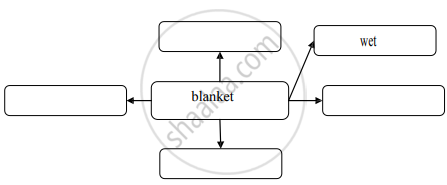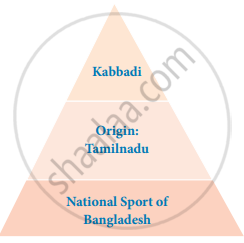Advertisements
Advertisements
प्रश्न
Comment on the contemporary concern that the poem echoes.
उत्तर
Poet is concerned about the pace with which the traditions are changing and are affected by modern notions. The value attached to the trees in earlier times is not of concern to people living in modern society. The old cultural values are breaking free giving way to western science and studies. The religious values that were inculcated in a child from her/his childhood are payed no heed. Life is busy and is consuming not just our time and space but our lifestyle. The moral values our tradition was raised on are now treated as bygones. The poet wonders at the change our society is undergoing and has written the poem on it.
APPEARS IN
संबंधित प्रश्न
What was Mr. Otto Frank's major contribution to the world?
Big male elephants throw logs at electric fences because
Comment on the capitalisation of all the words in the line:
'Children Must be Disciplined'.
Give a brief account of the interaction between Grandpa and Jo.
Discuss in your class.
What are the advantages of learning science?
Guess the meaning of the following words and phrases:
untold wealth, closest to the Emperor’s heart, grave offence, banish.
Write a recipe for the stone soup.
Who is the speaker in the poem?
Talk about your favourite season. (A one-minute activity.)
Which other things in nature can say –
'For men may come and men may go,
But I go on for ever.'
Which of the words and phrases in the poem will you use in a realistic description?
Put a tick mark against the ones you will use.
- little
- shining tail
- golden scale
- cheerful
- grin
- claws
- gently smiling
- jaws
Where was the well situated?
Write what the lark does.
Write a paragraph on ‘The Grumble Family’ and their attitude towards other folks.
Mention at least two expressions which shows that Mrs. Krishnan was not willing to have Zigzag at home?
Write the name of the toys against each picture.

Find out the rhyme scheme employed in the fourth stanza.
Read the lines and answer the questions.
And in fighting for their country, faith and king
noble impressions on people’s minds would ring
- What does ‘noble impression’ mean?
- Who can leave a noble impression?
Describe what the author saw when he went back to the island.
Identify the speaker/character.
They somehow managed to put him on the platform.
Choose the odd one out.
Try your own.

Answer using Yes or No and pick sentence from the story to support your answer.
Was Robinson alone in the island?
The villagers took oath not to harm the _______.
Why did Bala go to Chennai with his father?
Write the word with same meaning.

eraser- ______.
Write the word with same meaning.

purse- ______
What should we do for success?
Write the related words as shown in the example.

The passage given below is on Kabbadi. Read the passage and complete the activities that follow.
Kabbadi (கபடி - in Tamil) is a contact team sport that originated in Tamil Nadu, India. It is the national sport of Bangladesh. It is also popular in South Asia and is the state game of the Indian states of Tamil Nadu, Kerala, Andhra Pradesh, Bihar, Haryana, Karnataka, Maharashtra, Punjab, and Telangana.

Kabbadi is played between two teams of seven players: the objective of the game is for a single player on offence referred to as a 'raider', to run in to the opposing teams half of a court, tag out as many of their defenders as possible, and return to their own half of the court–all without being tackled by the defenders. Points are scored for each player tagged by the raider, while the opposing team earns a point for stopping the raider. Players are taken out of the game if they are tagged or tackled, but can be 'revived' for each point scored by their team from a tag or tackle. The raider should hold his breath and utter the words like 'kabbadi kabbadi, hututu hututu, chadu kudu' etc. while the opponents try to catch him. If he stops uttering these words, he is considered out.
The game is known by its regional names in different parts of the subcontinent, such as Kabbadi or Chedugudu in Andhra Pradesh, Kabbadi in Kerala and Telangana, Hadudu in Bangladesh, Bhavatik in Maldives, Kauddi or Kabbadi in the Punjab Region, Hu-Tu-Tu in Western India and Hu-Do-Do in Eastern India and Chadakudu in South India. The highest governing body of Kabbadi is the International Kabbadi Federation.
Given below is the visual presentation of the first paragraph.

i) Represent the other paragraphs in a visual form of your choice(flow chart, mind-map, pie-chart, etc.).
ii) Choose the correct option.
1. A contact sport usually involves a ______contact between players.
- violent
- gentle
- physical
2. Kabbadi is a game played between ______.
- seven teams of two players
- two teams of seven players
- four teams of seven players
3. A single ______.
- player on offence is referred to as a raider
- offence is referred to as a raider
- raider is an offence by the player
iii) Answer the following.
- How does a raider score points for his team?
- When does a raider concede a point to the opponent team?
- Can a player be revived when he/she is out of the game? Explain your answer.
- Kabbadi is called by different names in different parts of India. Do you know how Pallankuzhi is called in Karnataka, Andhra Pradesh and Kerala?
